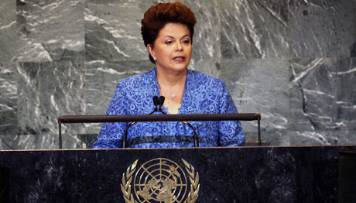One of the recurring themes in the international debate this year has been that around humanitarian intervention – fueled by the Arab Spring (which led to a NATO intervention in Libya), bloodshed in Syria (which has so far led to condemnation, but not intervention), and a civil war in Côte d’Ivoir (where France sent in a military force that, together with UN peacekeepers, deposed Gbagbo and put the legitimate winner, Ouattara, in the presidential palace).
The question about when and how to intervene is not new, as this 1996 article “Somalia and the Future of Humanitarian Intervention” shows. The debate shifted in the first decade of the new century, when the Evans-Sahnoun Commission (an international study group on humanitarian intervention) released its findings in 2001. In a similar, way, a 2004 UN secretary-general’s high-level panel formulated and promoted the idea that when states do not conduct their internal affairs in ways that meet internationally recognized standards, other states have a right to intervene. This idea would soon be called “the responsibility to protect.”
The Bush administration’s intervention in Iraq weakened the intellectual case for intervention of any kind, but did not undo the growing global consensus that under specific circumstances (and with UN approval), the international community had a responsibility to protect civilians if their government was unable or unwilling to do so.
In this month’s issue of Foreign Affairs, several points of view about the topic are articulated. In a reply to G. John Ikenberry, Amitai Etzioni describes China’s perspective that “respect for each other’s independence and sovereignty is vital to the maintenance of world peace”, making the case for R2P very difficult. Russia usually sides with China and has been one of the fiercest critics of foreign meddling in the Middle East, regarding it as a form of neoliberal imperialism. India is similary reluctant to weaken the Westphalian principle, and its government was reluctant to criticize Mubarak even after he had been ousted. Western and Goldstein, on the other hand, argue in “Humanitarian Intervention comes of Age” that the international community has learned a lot over the past two decades, and that interventions are “getting better all the time.”
“Humanitarian interventions involve an inherent contradiction: they use violence in order to control violence. Setbacks are almost inevitable, and so it is no surprise that the operations often attract criticism. Yet when carried out thoughtfully, legitimately, and as part of a broader set of mechanisms designed to protect civilians, the use of military force for humanitarian purposes saves lives. Mass atrocities, ethnic cleansing, and genocide are truly problems from hell, but their solutions — honed over the course of two decades of experience from Mogadishu to Tripoli — are very much of this world.“
Against this, in yet another interesting article in the same issue (“The True Costs of Humanitarian Intervention”), Valentino argues that interventions are great in theory, but that collateral damage is generally too high to justify them. He argues that “On the ground, the ethical clarity that advocates of human rights have associated with such actions — saving innocent lives — has almost always been blurred by a much more complicated reality.”
More importantly, he writes that “even if the ends of such actions could be unambiguously humanitarian, the means never are. Using force to save lives usually involves taking lives, including innocent ones.” He notes that while many remember that 18 soldiers died on a single day in 1993, few know that on that very same day over 500 Somalis died in the fighting. His recommendation to invest more in prevention sounds nice, but is hardly pragmatic given that not all crisis situations can be predicted and prevented.
In this context, Brazil’s President Dilma Rousseff has offered an interesting concept that may bring the two sides together. During her opening speech at the UN General Assembly earlier this year, Rousseff argued that better mechanisms were needed to assure that in an intervention unwanted damage would be kept at a minimum, calling it “the responsibility while protecting” (responsabilidade ao proteger). Since then, Brazil has been low-key about the idea, and it has attempted to integrate the concept into last month’s IBSA declaration. Brazilian President’s Rousseff argument during her speech that “while there was been a lot of talk (…) of the right to protect, there is little said about the responsibility while protecting” may seem insignificant, but in essence means that if carried out in a responsible manner, Brazil could, in principle, support intervention in the UN Security Council in the future – and India and South Africa are not fundamentally opposed to this idea.
In an op-ed in today’s Folha de São Paulo, Matias Spektor, professor at Fundação Getulio Vargas who coordinates the Center for International Relations, argues that the concept has the potential to turn into one of the Rousseff administration’s important contributions to the international debate. If accepted by the P5, the Brazilian initiative would impose constraints on interventions that could help reluctant actors such as China and Russia support them, mitigating worries that interventions cause more damage than necessary or support a hidden agenda. In order to successfully launch the concept, Spektor argues, Brazil needs to promote it on many levels – such as the G20 and during the BRICS summit, which takes place in India next year.
Whatever happens, the case shows Brazil is eager to turn into an international agenda-setter: It is not only willing to participate in international negotiations, but it also increasingly seeks to frame the debate and decide which issues should be discussed in the first place.
Read also:
Emerging powers remain divided on R2P and RwP
The Hindu: BRICS and the ‘Responsibility while Protecting’ concept
Can Neymar help Brazil regain soft power in Libya?
Photo credit: Shannon Stapleton/Reuters
Featured Photo credit: NewsOn









